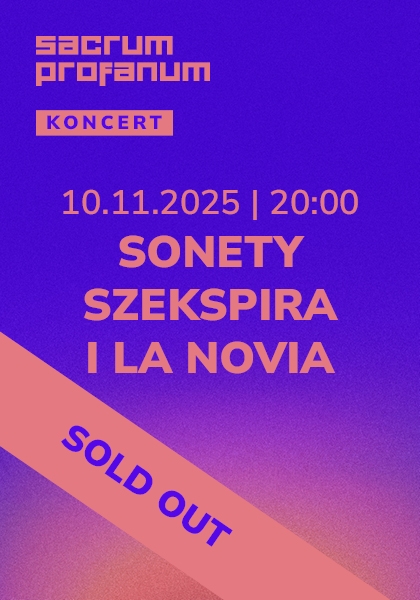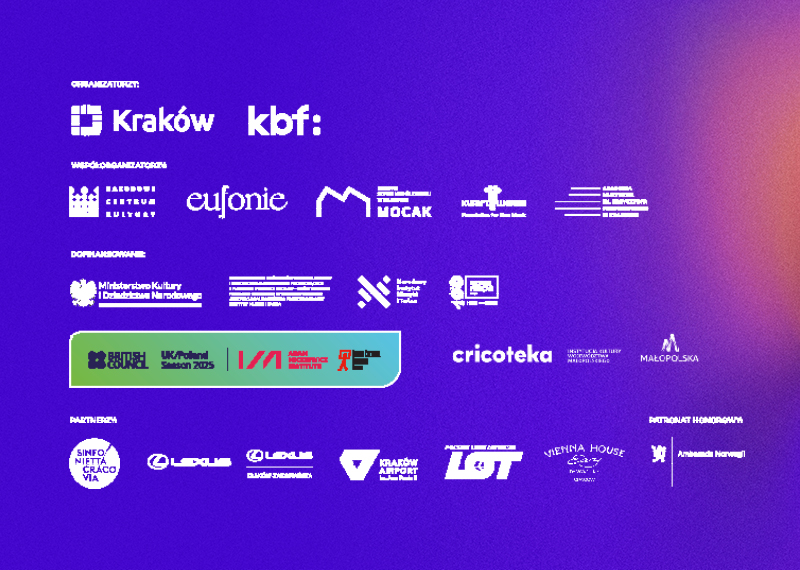ENG:
8:00 p.m. Shakespeare's Sonnets
Norwegian duo Westerhus and Ratkje are usually associated with dozens of cables, effects, samplers, amplifiers and computers. At this concert they will perform their music acoustically, using harmonium, violin, a bit of metal scrap, acoustic guitar and voices. Their expression evokes associations with both 19th-century Kristiania (Oslo's former name) and the saloons filled with Norwegian immigrants in the Midwest US.
Does it make sense to combine their new musical expression with the brutal and florid poetry of William Shakespeare? So many songs have been written, from grand stage works and inspired instrumental pieces to miniatures inspired by the playwright's work. The task seemed overly tempting. They wrote eight songs, some directly referencing the Sonnets no. 30 (All Losses Are Restored…), 73 (That time of year…), 137 (Though blind fool…) and 46 (Mine eye and heart…). In addition to the Sonnets, they also resort to Hamlet, Macbeth and Romeo and Juliet, with various new contexts.
Maja Ratkje / Stian Westerhus – All Losses Are Restored (2019–2024) 45’
Maja Ratkje - harmonium, voice
Stian Westerhus - acoustic guitar, violin, voice
9:30 p.m. La Novia
La Baracande offers a new perspective on the tradition of lamentation. They continue their exploration of songs handed down by Virginia Granouillet, a singer and lace maker from the Upper Loire in France. The ensemble ponders the nature of these violent stories - are they a ritual space for sharing the unspeakable, or are they a bogeyman, meant to chase away the worst, the things that should not happen? Jean Dumas selected a couple of them, and the musicians freely transcribed them to remove their overly educational tone where possible. They wanted to avoid a simple rehashing of the themes or vocabulary and adapt them to modern times, to make them more secular. La Baracande's musical setting creates a sonic counterpoint to these songs - wobbly rock, obsessed blues, deviant pop, free jazz, lullabies, canticle and tarantella - and tries to remain as lively and exuberant as possible.
All the traditional pieces are from the repertoire of Virginie Granouillet (1878-1962), collected by Jean Dumas in Roche-en-Régnier, Upper Loire.
La Baracande
Basile Brémaud - vocals, violin
Pierre-Vincent Fortunier - musette Béchonnet 11p bagpipes, violin
Yann Gourdon - hurdy-gurdy, drums
Guilhem Lacroux - guitar, harmonium
 Accessibility:
Accessibility:
The first part, although acoustic, can be sonically intense but will not be very loud. There may be disturbing sounds, and the lyrics, taken from Shakespeare, may have a tragic overtones and will be sung in English.
The second part will be a quasi-rock concert, with considerable intensity of the music and high volume. The content of the lyrics is lamentative, tragic and macabre, and will be sung in French.
The venue is adapted to the needs of people with mobility difficulties. The building does not offer induction loops or FM systems. Assistance for visually impaired individuals* is also available. You can enter the building with a support dog and a guide dog.
 By purchasing tickets for these events you confirm that you have read and understood the provisions of the Organiser's Terms and Conditions for the event.
By purchasing tickets for these events you confirm that you have read and understood the provisions of the Organiser's Terms and Conditions for the event.
The concert is organised in cooperation with the Royal Norwegian Embassy and the French Institute in Poland.
Financed from the funds of the Minister of Culture and National Heritage from the Culture Promotion Fund - a state earmarked fund - as part of the 'Music' programme implemented by the National Institute of Music and Dance.

 Dostępność:
Dostępność: